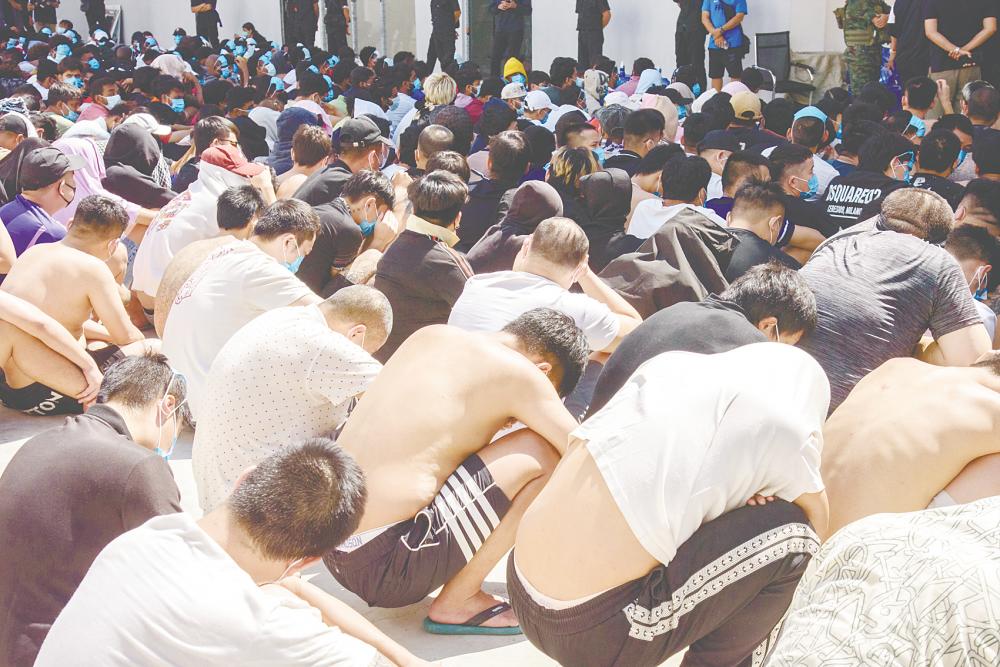ONE of the fastest-growing forms of human trafficking in Southeast Asia, and particularly in Malaysia over the past three years, is trafficking for forced criminality.
This involves the coercion and deception of individuals into large-scale financial fraud operations, often linked to cybercrimes such as online scams, extortion and money laundering.
Trafficking for forced criminality refers to the exploitation of individuals through coercion, force or deception to compel them into criminal activities for the financial gain or benefit of traffickers.
Victims are often forced to become online scammers, drug couriers, money mules or are coerced into acts of terrorism or activities that facilitate terrorism, among other crimes.
Reports indicate that these criminal operations occur in legal and illegal establishments, including casinos, hotels, entertainment centres and businesses registered as legitimate entities.
Many of these sites are secured within enclosed or fenced-off areas where victims are confined and forced to engage in cybercrimes, such as international financial fraud.
Currently, Section 2 of the Anti-Trafficking in Persons and Anti-Smuggling of Migrants Act 2007 (Atipsom) does not explicitly recognise forced criminality as a specific form of exploitation. However, it does mention “any illegal activity”, which can be interpreted to cover such acts.
Nonetheless, clearer provisions and amendments are urgently needed, especially in light of the increasingly complex and technologically advanced nature of these crimes, which often involve tools like artificial intelligence (AI) within organised criminal networks.
According to Datuk Fadil Marsus, deputy director (Intelligence and Operations) of the Criminal Investigation Department at Bukit Aman, the police recently rescued 504 Malaysian nationals from Thailand, Myanmar, Cambodia and other countries who were at risk of becoming victims of forced criminality.
However, only around 10% were confirmed as genuine trafficking victims. The majority had voluntarily joined scam syndicates and only sought rescue after facing threats or abuse for failing to meet the syndicate’s profit targets.
Some of these individuals also acted as agents, recruiting other Malaysians into similar scams abroad, and many have reportedly been uncooperative with authorities upon their return.
These syndicates exploit people’s vulnerabilities, targeting those easily enticed by promises of high-paying overseas jobs. They typically seek individuals fluent in languages such as English and Chinese to carry out cyber fraud.
Victims are forced to engage in a range of online crimes, including romance scams (also known as “pig butchering”), crypto fraud, money laundering and illegal gambling.
While some willingly enter these syndicates, they often find themselves trapped in exploitative cycles, unable to leave unless ransom payments are made by their families.
Survivors who have managed to escape have reported enduring severe torture at the hands of these syndicates.
Two common patterns emerge from these cases. First, individuals who were initially deceived and exploited later become agents or recruiters themselves. After witnessing the lucrative returns from scam operations, some choose to remain and actively participate in recruiting others, transitioning from victim to perpetrator.
Second, those lured by legitimate job offers are then forced into criminal activities, such as online fraud, without any means to escape the cycle of exploitation.
Under Atipsom, individuals officially identified as trafficking victims are eligible for Interim Protection Order and may be placed in a shelter for up to 21 days while investigations are ongoing.
Malaysia currently operates 10 such shelters, providing refuge for Malaysian and foreign victims. The programmes at these facilities focus on psychosocial support, spiritual well-being, education and physical recovery.
The Women, Family and Community Development Ministry, along with other NGOs, plays a crucial role in addressing the psychological trauma endured by victims.
However, there is an urgent need for more specialised programmes tailored to the unique experiences of victims of forced criminality whose trauma may differ significantly from that of those trafficked for sexual exploitation or forced labour.
Psychosocial interventions could also be administered at victims’ homes or alternative safe spaces for those who decline placement in shelters, facilitating their recovery and reintegration into society. Despite concerted regional efforts to combat forced criminality, three major challenges persist. First, there is a prevailing misconception that limits human trafficking to forced labour and sexual exploitation, overlooking the globally recognised element of criminal exploitation.
Second, the investigation and prosecution of these crimes are hampered by syndicates’ cross-border operations, sophisticated structures and advanced technologies, all of which impede law enforcement efforts.
Third, international legal cooperation remains inadequate. Although Malaysia is a member of the Bali Process, addressing this crime effectively requires stronger transnational collaboration, particularly in areas such as mutual legal assistance and extradition.
In conclusion, tackling forced criminality demands a comprehensive approach that combines holistic law enforcement strategies, a nuanced understanding of trafficking dynamics related to criminal exploitation and enhanced international cooperation.
Only through such coordinated action can Southeast Asia begin to dismantle the expanding networks of forced criminal exploitation.
Dr Haezreena Begum Abdul Hamid is a criminologist and senior lecturer at the Faculty of Law, Universiti of Malaya. Comments: letters@thesundaily.com









